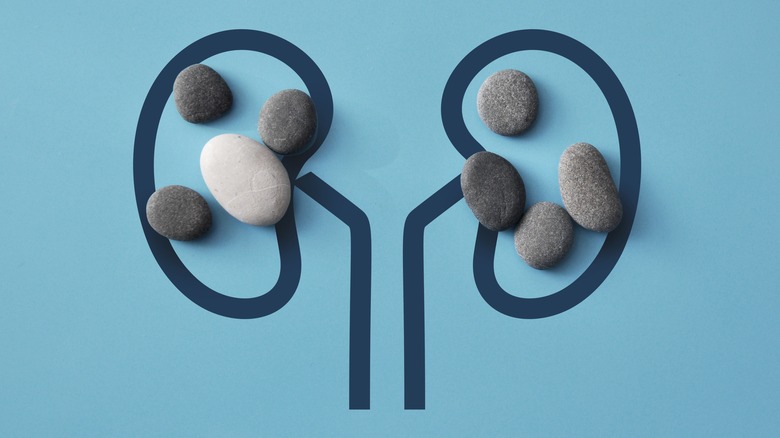How Long Does It Take To Pass A Kidney Stone?
Kidney stones are made of certain substances found in your body. These substances include calcium, oxalate, and uric acid. About 80 to 85% of most kidney stones are made from calcium and the rest are made from uric acid, per Harvard Health Publishing. Most of the time, these substances are excreted in your urine with no problems. However, sometimes these substances crystallize and turn into unevenly-shaped stones that can range in size from a grain of sand to a golf ball. The average kidney stone is about the size of a chickpea, according to Cleveland Clinic.
While some kidney stones are so small that you might never feel them pass, others can cause extreme pain. When a kidney stone passes from a kidney to the ureter, it can block the flow of urine, and this can cause pain — some of it severe. Pain is generally located between the stomach and back on one side of the body. As the stone moves toward the bladder, it can also cause pain in the groin. Other symptoms include inability to urinate, frequent urination, blood in the urine, nausea, and vomiting (per Harvard Health Publishing).
The size and amount of kidney stones affect how long it takes to pass them
The size of a kidney stone will determine how long it takes to pass. Kidney stones that are smaller than 4 millimeters might take one to two weeks to pass (via Cleveland Clinic). That said, some small stones can pass in one to two days, according to the National Health Service.
Stones larger than 4 millimeters can take anywhere from two to six weeks to pass, Cleveland Clinic reports. It might take months for some stones to pass depending not only on their size, but how many there are, Harvard Health notes.
Once a kidney stone makes its way to the bladder, it generally takes a few days to pass. However, in older men with large prostates, the process could take longer (via Cleveland Clinic). When a stone is in the bladder, it might create an urge to urinate, frequent urination, and groin pain, per Harvard Health.
Sometimes doctors will need to remove kidney stones
Occasionally, kidney stones become too large or painful to pass, and you may need to undergo a procedure to remove them (via WebMD). The most common treatment is shock wave lithotripsy, in which high-energy shock waves are aimed at the kidney to break it up into smaller pieces that can pass easily. Another procedure, called a ureteroscopy, involves placing a flexible scope in the kidney or ureter and removing stones with a small basket. Percutaneous nephrolithotomy is generally used when a ureteroscopy is unsuccessful. Doctors either break up stones with sound waves and vacuum out the smaller pieces, or they surgically remove the stone through a tube.
If you think you might have a kidney stone, you should see your doctor, who will determine whether or not you need treatment. Your doctor can prescribe medications that will help with pain as well as relax your ureter, making stones easier to pass, per Cleveland Clinic. Even if the pain goes away, you should check back with your doctor if the kidney stone doesn't pass within four to six weeks.



